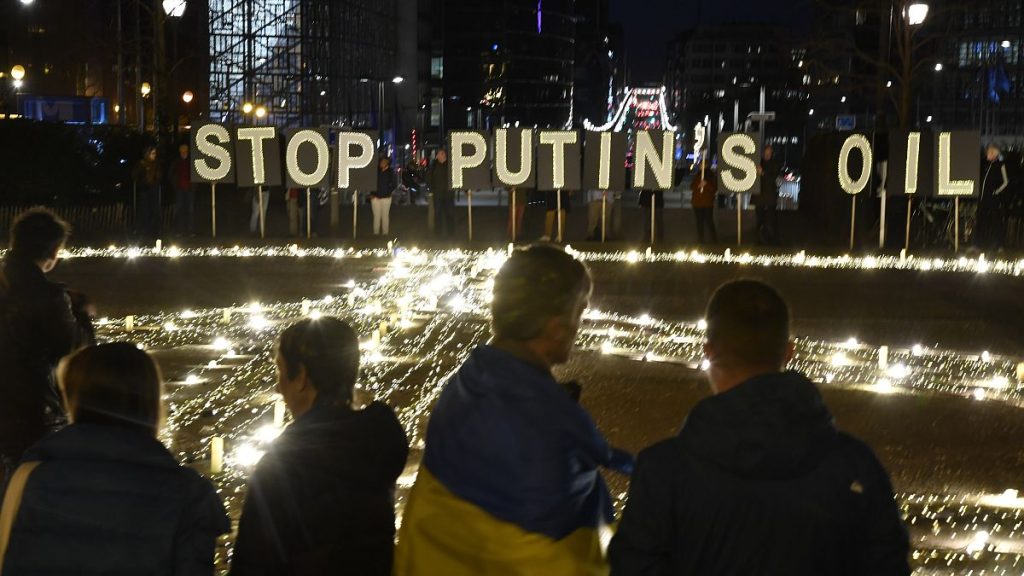Summarize this content to 2000 words in 6 paragraphs
The European Union on Wednesday issued new sanctions against Russia, targeting the “shadow fleet” of tankers. Ukraine’s Presidential advisor and commissioner for sanctions policy says he welcomes the step, but believes pace remains a problem.
The European Union on Wednesday issued new sanctions against Russia, targeting the “shadow fleet” of tankers that Moscow has deployed to circumvent Western restrictions on oil trade and maintain a source of revenue that is crucial to fund the war against Ukraine.The fleet consists of old-age, uninsured ships whose poor condition has stoked fears of an impending environmental disaster near or inside European waters.A handful of Chinese companies suspected of enabling Russia’s production of drones are also blacklisted as part of the agreement, a diplomat told Euronews.The sanctions represent the 15th package since the start of the Russian invasion in February 2022.Ukraine’s presidential advisor and commissioner for sanctions policy Vladyslav Vlasiuk said he welcomes the step, but told Euronews that pace remained the problem.“We like that this package is finally adopted, we like what we see in there. But the pace clearly is not fast enough.” Right now, the EU should start working on the next package which should be adopted no later than the end of February: “And that should include some more meaningful measures like sectoral sanctions and some others. So thanks, but that is not enough.” Wednesday’s decision marks the first sanctions agreed during Hungary’s presidency of the Council of the EU, which many diplomats had feared would slow down action on the war front due to Budapest’s insistence on maintaining close ties with Moscow.Vladyslav Vlasiuk says he sees “good signals” from the new Commission, and specifically Commissioner Dan Jørgensen who is responsible for energy, and who Vlasiuk believes is “committed to end the EU’s dependence on Russian energy”.“We are trying now to extend the cooperation with the commissioner offices and different DG’s on different sanctions stream. That would include financial sanctions, that would include, of course, energy sanctions, especially the LNG and especially the Rosatom sanctions. That would of course include the Kaja Kallas office on the individual designations. So I think, that given the developments in this world, given the increasing cooperation between Russia, North Korea and Iran, more and more challenges are rising.”US sanctions and the new administrationThe Biden administration is considering implementing new, harsher Russian oil sanctions ahead of the inauguration of US President-elect Donald Trump, Bloomberg reported on December 10, citing its sources.Ukraine’s Presidential advisor and commissioner for sanctions policy says Kyiv’s expectations are high when it comes to the new US administration:“President elect Trump clearly said that it is the oil revenues which help Putin to continue his war. So I think that all of that proper understanding of the situation is already very much there. And I’m hoping that we would continue our operation with the new US government on the further sanctions measures targeted against the terrorists regimes.”Are sanctions hurting the Russian economy?Renewed packages of sanctions from the EU and US were supposed to weaken the Russian economy. But not only it has survived, it even grew by 4.4% in the second quarter of 2024, with unemployment low at 2.4%. Factories are largely running at full speed, in many cases to produce items that the military can use, such as vehicles and clothing. But with interest ratesat 21% and the fact that the Russian rouble dropped to 110 points against the US dollar by the end of November indicate that the country’s economy is not entirely healthy. Vlasiuk believes Russia’s economy has “really started to struggle”. For a few years now, he says, Russia’s economy has been “divided into two parts”A tale of two economies“One part is the military industry, and they’re doing quite fine on that. They’ve been quite good at producing the weapons, the arms and ammunition. But that is just one part of the economy. On the other part of the economy, they’ve been really struggling. They cannot do much in that area. They have a problem with investment. They have a problem with finance and available credits. They have a big shortage of employees. And that altogether is clear Indicator of that the economy of Russia is out of balance.” Vlasiuk says this situation has started “biting heavily the government” but the government “cannot do anything” since the only possible solution to that is to stop the military industry growth. If Moscow doesn’t – as it hasn’t until now – it will face “the collapse of the other parts of the economy”, Vlasiuk says. “I think that we are very much there at the edge. Either, Russia’s rulers will have to stop expenditure for military industry or just sit and observe how the other parts of the economy will start collapsing.”
Keep Reading
Subscribe to Updates
Get the latest creative news from FooBar about art, design and business.
© 2026 Globe Timeline. All Rights Reserved.













